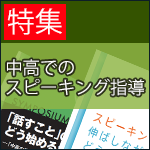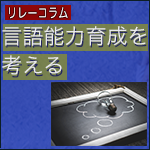研究ノート・研究会レポート一覧
- 2023年度
- 2022年度
- 2021年度
- 2020年度
- 2019年度
- 2018年度
- 2017年度
- 2016年度
- 2015年度
- 2014年度
- 2013年度
- 2012年度
- 2011年度
- 2010年度
- 2009年度
- 2008年度
「研究ノート」は、ARCLEの研究理事・研究員が注目する自由なテーマを執筆するコーナーです。今回は、慶應義塾大学・田中茂範先生です。
オバマの就任演説についてのノート
慶應義塾大学 田中茂範
第44代アメリカ合衆国大統領に就任したバラク・オバマ(Barack Hussein Obama, Jr.)の就任演説(2009年1月20日)を聞いていたとき、あるフレーズがぼくを捉えた。“…we must pick ourselves up, dust ourselves off, and begin again the work of remaking America.”がそれである。そのフレーズは30年以上も前に、フィラデルフィアのTemple Universityでアメリカ研究を学んでいた時代にぼくを連れ戻してくれた。その時(1976年ごろ)に、このフレーズに出会ったのだ。それは、Dorothy Fields作詞、Jerome Kern作曲のミュージカル映画“Swing Time1”(1936年)の劇中歌“PICK YOURSELF UP”の歌詞中のフレーズである。1930年代の文学を専門とする先生が紹介してくれたものだった。オリジナルは、以下のようになっている。
Nothing’s impossible I have found,
For when my chin is on the ground,
I pick myself up,
Dust myself off,
Start all over again.
Don’t lose your confidence if you slip,
Be grateful for a pleasant trip,
And pick yourself up,
Dust yourself off,
Start all over again.
(Dorothy Fields作詞、Jerome Kern作曲 “PICK YOURSELF UP”より一部抜粋)
ここには、「地面に倒れ、あごが地面についている」という状況が背景にあり、そこで、“I pick myself up, Dust myself off,(立ち上がり、ホコリを払う)”が、字義的にも、そして比喩的にも意味を成す。1936年といえば、米国は大恐慌の最中であり、それは国民を鼓舞するコトバであった。オバマが2009年の経済危機の最中にこのコトバを持ち出したことは興味深い。
実は、このフレーズがきっかけになり、オバマの就任演説2をかなり徹底的に文体分析してみた。すると、いくつもおもしろい発見があった。そのひとつをここで紹介したい。それは、代名詞they やwe の使い方であり、その代名詞が指す対象は誰かという問題である。
まず、【1】の箇所をみてみよう。
| 【1】 | For us, they packed up their few worldly possessions and traveled across oceans in search of a new life. For us, they toiled in sweatshops and settled the West; endured the lash of the whip and plowed the hard earth. For us, they fought and died, in places like Concord and Gettysburg; Normandy and Khe Sanh. |
“For us, they packed up their few worldly possessions and traveled across oceans in search of a new life.”まで読むと、メイフラワー号(the Mayflower)に乗ってアメリカに移住したピューリタン(Puritans = Whites)を思い起こさせるようであるが、“they toiled in sweatshops and settled the West; endured the lash of the whip and plowed the hard earth.”までくると、アフリカから連れてこられた奴隷たち(Blacks)に連想内容が変わる。これは、白人でも黒人でもなく、民主党でも共和党でもない、1つのアメリカ、アメリカ人を理想に掲げるオバマが白人と黒人の融合を文体的に行った事例と読み取ることもできる。
また、【2】の箇所をみてみよう。
| 【2】 | We are shaped by every language and culture, drawn from every end of this Earth; and because we have tasted the bitter swill of civil war and segregation, and emerged from that dark chapter stronger and more united, we cannot help but believe… |
最初のwe はアメリカ人であることは間違いないが、“because we have tasted the bitter swill of civil war and segregation…”のsegregation は明らかに「人種隔離政策」のことを指し、苦しんだのは白人ではなく黒人であることから、ここでのwe は黒人の意味合いが強くなっている。
また、【1】の“they fought and died, in places like Concord and Gettysburg; Normandy and Khe Sanh.”におけるthey とは誰か。Concord は独立戦争、Normandy は第二次世界大戦、Khe Sanh はベトナム戦争で、これらの戦争におけるthey はアメリカ人たち(=アメリカ兵)だが、Gettysburg は南北戦争であり、内戦である。そうすると、they=アメリカ兵ではおかしい。内戦で多くの血を流したのは黒人たちであるといわれるからだ。
さらに、ここでなぜ“Gettysburg”が“Concord”“Normandy”“Khe Sanh”とともにリストされているかについてだが、奴隷解放宣言(Emancipation Proclamation,1863年)3が第16代アメリカ合衆国大統領エイブラハム・リンカーン(Abraham Lincoln) によって行われ、リンカーンを想起させる場がGettysburgだということを考えると、黒人にとって象徴的な場でもあるからだろう。
ちなみに、ゲティーズバーグの演説(The Gettysburg Address,1863年)4は272語という短いスピーチであったにもかかわらず、歴代大統領の演説の中でも、もっとも有名なものの1つである。オバマはリンカーンを尊敬しているといわれ、大統領就任演説もLincoln Memorialで行われた。それだけではない。文体的にもオバマはリンカーンの演説を参考にしている。
【3】はオバマの演説の抜粋だが、“shall ” が3度使われていることに注目したい。これはリンカーンのゲティーズバーグの演説(【4】)を意識したものである。それだけではなく、that 節を反復するところにも、両テキスト間での構造的類似性を読み取ることができるだろう。
| 【3】 | …and because we have tasted the bitter swill of civil war and segregation, and emerged from that dark chapter stronger and more united, we cannot help but believe that the old hatreds shall someday pass; that the lines of tribe shall soon dissolve; that as the world grows smaller, our common humanity shall reveal itself; and that America must play its role in ushering in a new era of peace. |
| 【4】 | It is rather for us to be here dedicated to the great task remaining before us -- that from these honored dead we take increased devotion to that cause for which they gave the last full measure of devotion -- that we here highly resolve that these dead shall not have died in vain -- that this nation, under God, shall have a new birth of freedom -- and that government of the people, by the people, for the people, shall not perish from the earth. |
久しぶりに、すばらしいテキストと向き合うことができた。なにより、あの30年前の若き日々にぼくを連れ戻し、当時の思い出に浸ることができたことは、心地よい時間であった。
*引用文中の斜字・太字は著者追記
| 1 | “Swing Time”(邦題「有頂天時代」)米、1936年、ジョージ・スティーヴンズ監督 |
| 2 | 「読売新聞」2009年1月21日 |
| 3 | http://www.history.navy.mil/faqs/faq57-2.htm |
| 4 | http://showcase.netins.net/web/creative/lincoln/speeches/gettysburg.htm |






